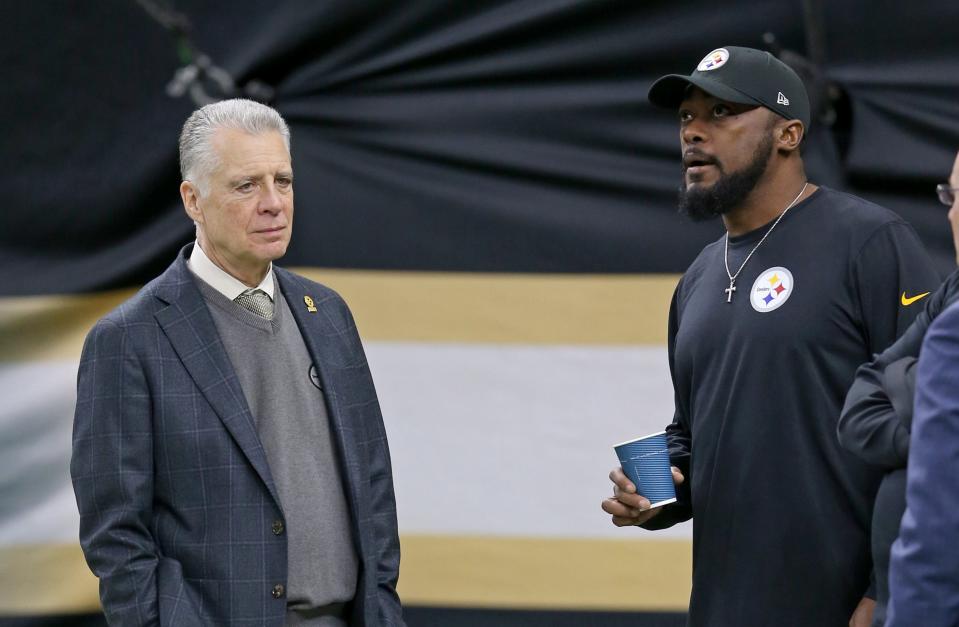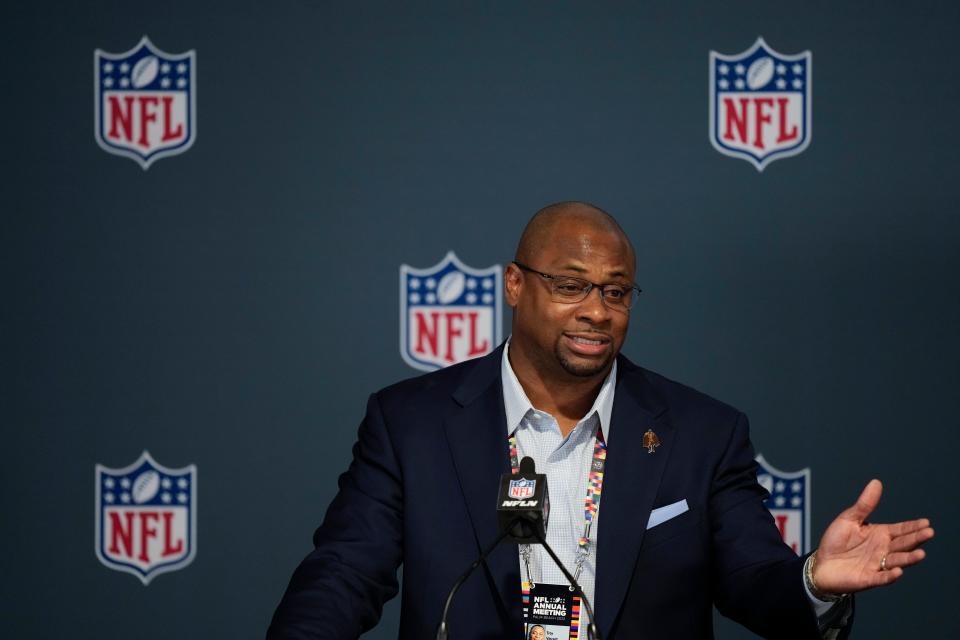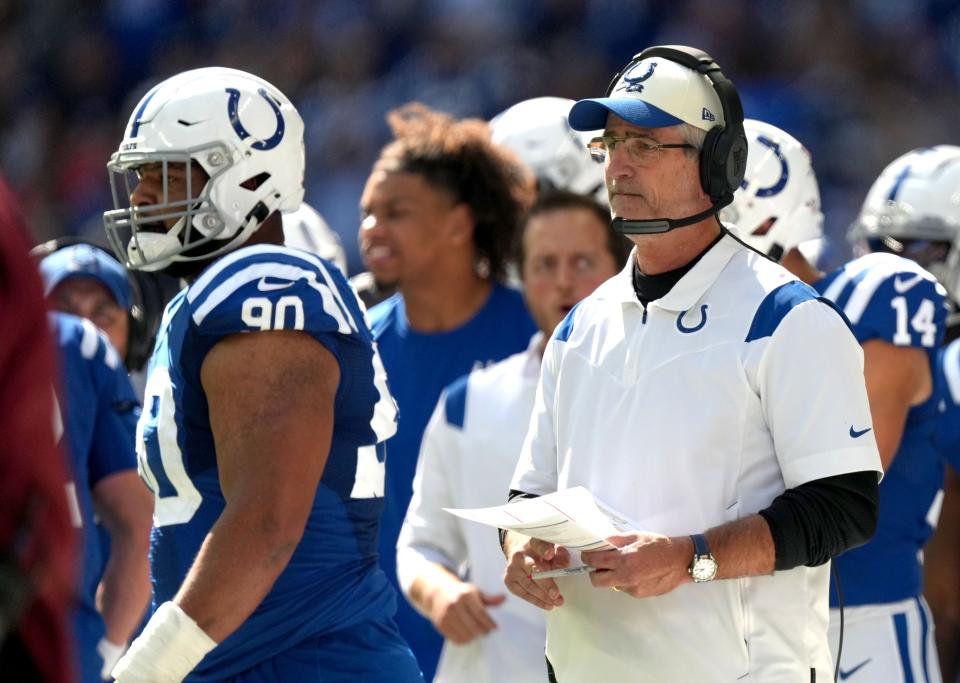Inside the NFL owners meeting: White coaches challenge owners on league's diversity woes
One by one, Pete Carroll, John Harbaugh, Frank Reich and Andy Reid addressed the NFL owners at this year’s annual league meeting, advocating for Black coaches on their staffs now and those they’ve crossed paths with during their lengthy careers.
They vouched for the abilities of these coaches who are routinely passed by for the NFL’s top jobs, praising their skills and leadership qualities.
These white head coaches, some of the most prominent in the game today, spoke of the influence Black coaches have had on them and in their locker rooms, trying to make owners recognize what they would find if they would only look beyond the color of these coaches’ skin.
Their passion was clear, as was their sense of urgency, with Carroll at one point essentially asking owners what was wrong with them.
“Maybe some people didn’t like what was said. When you open the floor, you get this type of honesty,” Pittsburgh Steelers owner Art Rooney II told USA TODAY Sports.
“There were some things said that owners wouldn’t agree with.”
EXPLORE: Which NFL teams have the most diverse coaching staffs?
NFL COACHES PROJECT: USA TODAY Sports compiled and analyzed demographic data for NFL coaches at every level
Conversations at the annual meeting, also known as the NFL owners meeting, rarely become public, and Rooney did not want to go into extensive detail because what’s said there is supposed to stay private. Carroll and Reid also declined to comment on what they said to owners.
But yet another hiring cycle had ended with the NFL no more diverse in its most high-profile positions than it was 20 years ago. Former Miami Dolphins coach Brian Flores had sued the league and some of its teams for racial discrimination, accusing the NFL of lip service in its sincerity to providing opportunities for minority coaches.
Staying silent was no longer an option.
“We were speaking from our hearts. And what that was, was, `Listen, we need to see some results,’” Reich told USA TODAY Sports last month. “We’ve got a lot of good people, great owners, great owners who are great human beings and they’re great businessmen. We’re all trying to accomplish the same thing, to make the NFL the best league and make the most impact in society. We have a platform that can do that.
“If we’re going to have a platform, to have the greatest sports organization in the world, we need to do better at some of the diversity issues when it comes to coaching.”
WHAT WE LEARNED: Four key findings from USA TODAY's analysis of NFL coaches
GRAPHIC NOVEL: A brief history of Black NFL coaches

The NFL adopted the Rooney Rule, named for Art Rooney’s late father, Dan, in hopes it would increase the number of Black coaches in a league where more than two-thirds of the players are Black. It initially required teams to interview at least one minority candidate for any head coaching job, and has since been expanded to include coordinators, quarterbacks coaches and senior-level front office positions. Teams must also now interview at least two diverse candidates for any head coach openings.
Yet of the 10 openings in the 32-team league this last offseason, only two were filled by Black coaches. That gave the NFL three Black head coaches when the season began, the same number as when the Rooney Rule was implemented in 2003. Steve Wilks makes it four now, having been named interim head coach of the Carolina Panthers after they fired Matt Rhule last week.
WHAT'S IN IT FOR INTERIMS?: Carolina's Steve Wilks latest Black coach thrust into challenging role
Three other teams are also headed by men of color; Robert Saleh, who is of Lebanese descent, coaches the New York Jets; Mike McDaniel, who is biracial, is the Miami Dolphins' coach; and Ron Rivera, who is Hispanic, leads the Washington Commanders.
This is not an anomaly.

Of the 72 head coaches hired in the last decade, just 14 have been men of color. In a league where historically about two-thirds of the players are Black, there has never been more than eight non-white coaches in a single season. That number was reached in 2011 and 2017.
“We’ve seen progress on a number of fronts,” said Rooney, who chairs the NFL's Diversity, Equity and Inclusion Committee. “There are more Black general managers than we’ve ever had. We’re hoping that progress moves to the head coaches.”
But the white coaches who spoke at the owners meeting, held the last weekend in March in Palm Beach, Florida, are tired of progress that is incremental at best.
Troy Vincent, the NFL's executive vice president of football operations, said white coaches, such as Carroll, Reid and Reich, often come to him with names of Black and brown coaches who would be good candidates for promotion. But this is the most vocal Vincent said he can remember the coaches being as a collective.
And for someone who's been on the front lines of trying to improve diversity in the NFL, seeing white coaches lobby owners on behalf of Black coaches who’ve failed to advance because of systemic racism was heartening.
“I got very emotional listening because it was such a breath of fresh air,” Vincent told USA TODAY Sports last month, adding he had to turn his head to the side while the coaches spoke. “These men are passionate about what they do, and they speak very, very highly of individuals that have touched their lives or impacted their lives.
“In that particular room, to be courageous — because that's what it takes to do that and to put it on the line — it was refreshing. It was refreshing to see and hear.”
'DIDN'T LOOK THE PART': The reasons Black coaches don't get NFL head coaching jobs

And it wasn’t just the coaches, Vincent said. Some team executives chimed in, including Chris Ballard, Howie Roseman and John Lynch, general managers of the Colts, Philadelphia Eagles and San Francisco 49ers, respectively.
Some owners spoke, too, vouching for the people of color they’ve hired.
“In that setting it's easy to be silent. But these men, they spoke,” Vincent said.
Reich was quick to say the focus shouldn’t be on him and the other white coaches, that they only said what they feel is right. But it is also a deeply personal issue for them, because they know the character of the men and quality of the coaches who are not being hired because of systemic racism.
Reid told the owners someone needed to hire his offensive coordinator, Eric Bieniemy, echoing what he has often said publicly. Bieniemy has played a big role in the development of Patrick Mahomes, who won both a Super Bowl and NFL MVP honors in his first two seasons as a starter, but has not gotten a head coaching job despite being considered by multiple teams each of the last four years.
Reich got his first coaching job with Tony Dungy in Indianapolis and, after Dungy retired, worked for Jim Caldwell.
“This issue is really important to them and because of my love and respect for them, this issue is really important to me,” Reich said. “It’s one thing to say, `Yeah, I agree this is an important issue,’ but it’s another thing to actually try to take steps to try to help.”
Coaches are given time to address the owners at every annual meeting, allowing them to raise concerns. At this year’s meeting, owners also wanted to know what coaches thought about expanding the Rooney Rule again to require each team to hire a minority offensive assistant who will work closely with the head coach, offensive coordinator and quarterbacks coach.
It has since been adopted.
Reich said he thinks the new rule will help, because it will give coaches of color entrée to the positions that recently have been a springboard to head coaching jobs. But Reich said he also hopes owners realize the best coaches are not necessarily “offensive gurus,” but those who are the best leaders.
“I was one of the guys in the locker room,” said Reich, who spent 13 seasons in the NFL as a backup quarterback. “What guys in the locker room want is a leader of men. I think that’s got to be a more central part of the focus. I think that’ll open it up to more people.”

Reich said the owners he knows are well-intended, and he spoke of the pride he feels in working for someone like Colts owner Jim Irsay, who has been one of the more proactive owners when it comes to diversity.
But a disconnect remains between what owners say they want and what they do, and that is what Reich and his fellow coaches were trying to make plain.
“It’s a hard issue,” Reich said. “We have to be intentional. I think we are in some ways. I think we’re all just saying, we can do better. Not only can we do better, but we need to see some results. The NFL is a results-driven league. If that’s the case, we need to see some results in this area as well.
“For all the resources we have, and for all the good men and women that are in this league — and I really believe that — something is missing. Because we’re not seeing the results we should see in areas of leadership in the league.
“We need to see more progress.”
USA TODAY Sports reporters Tom Schad and Chris Bumbaca contributed to this report.
This article originally appeared on USA TODAY: How white NFL coaches challenged owners on league's diversity woes
